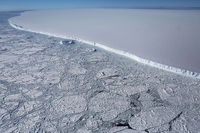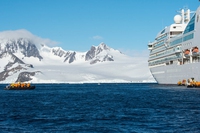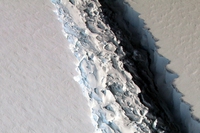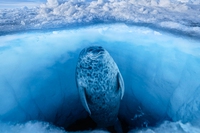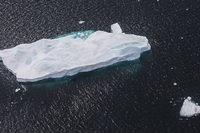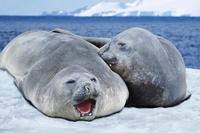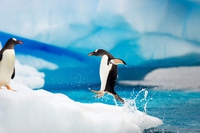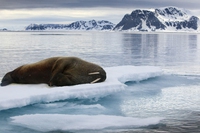
Antarctic sea ice reaches new record low
The extent of sea ice in Antarctica reached a new record low on 21st February 2023.
The extent of sea ice in Antarctica reached a new record low on 21st February 2023.
In 2017 the world’s largest iceberg, known as A68, detached from the Larsen C ice shelf and began drifting along the ocean. Today, it has almost entirely melted away.
Antarctica is becoming more accessible, so much so that tourism has seen a 53 per cent increase in the last four years. And climate change is on of the reasons people visit the frozen continent.
It finally broke off. The iceberg A68, twice the size of Luxemburg, is no longer part of Antarctica’s Larsen C ice shelf, which could also collapse.
National Geographic photographer Paul Nicklen has opened his first gallery in the city of New York, United States. It focuses on animals, the environment and the risks they both face due to climate change through images shot in diverse areas of the world including the Arctic and Antarctica. I’m taking over the @pewenvironment account this week, starting today on
The Arctic is registering an unusual winter this year. While temperatures hit a new record in November, it is now sea ice cover to have recorded its lowest extent at a time when it should be at its maximum extent. In January 2017 the ice cover was 13.38 million square kilometres, the lowest extent in almost
A huge iceberg measuring 5,000 square kilometres, roughly the side of the US state of Delaware, is set to break off the Antarctic Peninsula. When this happens, the ice shelf Larsen C – a floating platform of ice formed by the flow of land-based glaciers or ice sheets into the ocean – located in West Antarctica will
L’area protetta si trova nel Mare di Ross, nel Pacifico, e occuperà una superficie di 1,55 milioni di chilometri quadrati.
Finding someone who doesn’t like penguins is quite impossible. These birds – with their funny gait and impossibility of flying – inevitably trigger fondness. British scientists are relying on such liking to find volunteers to look at thousands of pictures of penguins. Researchers are trying to figure out the effective impact climate change has on penguin populations
In 40 years, the Arctic will run out of ice during summer months, as proven by the lowest icecap winter extension ever registered by satellites last March. It is a phenomenon involving half of the Arctic ice. These are some of the effects caused by the on-going climate change, documented by WWF in
